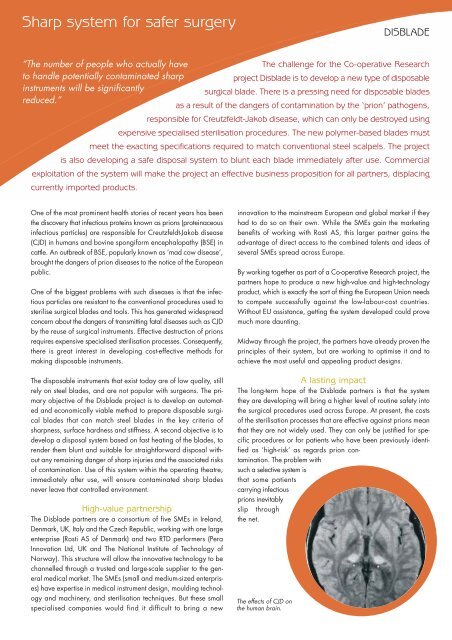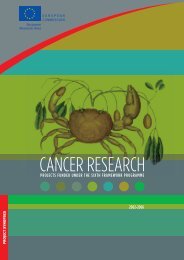Co-operative Research projects for SMEs - European Commission ...
Co-operative Research projects for SMEs - European Commission ...
Co-operative Research projects for SMEs - European Commission ...
Create successful ePaper yourself
Turn your PDF publications into a flip-book with our unique Google optimized e-Paper software.
Sharp system <strong>for</strong> safer surgery<br />
“The number of people who actually have<br />
The challenge <strong>for</strong> the <strong>Co</strong>-<strong>operative</strong> <strong>Research</strong><br />
to handle potentially contaminated sharp<br />
project Disblade is to develop a new type of disposable<br />
instruments will be significantly<br />
surgical blade. There is a pressing need <strong>for</strong> disposable blades<br />
reduced.”<br />
as a result of the dangers of contamination by the ‘prion’ pathogens,<br />
responsible <strong>for</strong> Creutzfeldt-Jakob disease, which can only be destroyed using<br />
expensive specialised sterilisation procedures. The new polymer-based blades must<br />
meet the exacting specifications required to match conventional steel scalpels. The project<br />
is also developing a safe disposal system to blunt each blade immediately after use. <strong>Co</strong>mmercial<br />
exploitation of the system will make the project an effective business proposition <strong>for</strong> all partners, displacing<br />
currently imported products.<br />
One of the most prominent health stories of recent years has been<br />
the discovery that infectious proteins known as prions (proteinaceous<br />
infectious particles) are responsible <strong>for</strong> Creutzfeldt-Jakob disease<br />
(CJD) in humans and bovine spongi<strong>for</strong>m encephalopathy (BSE) in<br />
cattle. An outbreak of BSE, popularly known as ‘mad cow disease’,<br />
brought the dangers of prion diseases to the notice of the <strong>European</strong><br />
public.<br />
One of the biggest problems with such diseases is that the infectious<br />
particles are resistant to the conventional procedures used to<br />
sterilise surgical blades and tools. This has generated widespread<br />
concern about the dangers of transmitting fatal diseases such as CJD<br />
by the reuse of surgical instruments. Effective destruction of prions<br />
requires expensive specialised sterilisation processes. <strong>Co</strong>nsequently,<br />
there is great interest in developing cost-effective methods <strong>for</strong><br />
making disposable instruments.<br />
The disposable instruments that exist today are of low quality, still<br />
rely on steel blades, and are not popular with surgeons. The primary<br />
objective of the Disblade project is to develop an automated<br />
and economically viable method to prepare disposable surgical<br />
blades that can match steel blades in the key criteria of<br />
sharpness, surface hardness and stiffness. A second objective is to<br />
develop a disposal system based on fast heating of the blades, to<br />
render them blunt and suitable <strong>for</strong> straight<strong>for</strong>ward disposal without<br />
any remaining danger of sharp injuries and the associated risks<br />
of contamination. Use of this system within the operating theatre,<br />
immediately after use, will ensure contaminated sharp blades<br />
never leave that controlled environment.<br />
High-value partnership<br />
The Disblade partners are a consortium of five <strong>SMEs</strong> in Ireland,<br />
Denmark, UK, Italy and the Czech Republic, working with one large<br />
enterprise (Rosti AS of Denmark) and two RTD per<strong>for</strong>mers (Pera<br />
Innovation Ltd, UK and The National Institute of Technology of<br />
Norway). This structure will allow the innovative technology to be<br />
channelled through a trusted and large-scale supplier to the general<br />
medical market. The <strong>SMEs</strong> (small and medium-sized enterprises)<br />
have expertise in medical instrument design, moulding technology<br />
and machinery, and sterilisation techniques. But these small<br />
specialised companies would find it difficult to bring a new<br />
innovation to the mainstream <strong>European</strong> and global market if they<br />
had to do so on their own. While the <strong>SMEs</strong> gain the marketing<br />
benefits of working with Rosti AS, this larger partner gains the<br />
advantage of direct access to the combined talents and ideas of<br />
several <strong>SMEs</strong> spread across Europe.<br />
By working together as part of a <strong>Co</strong>-<strong>operative</strong> <strong>Research</strong> project, the<br />
partners hope to produce a new high-value and high-technology<br />
product, which is exactly the sort of thing the <strong>European</strong> Union needs<br />
to compete successfully against the low-labour-cost countries.<br />
Without EU assistance, getting the system developed could prove<br />
much more daunting.<br />
Midway through the project, the partners have already proven the<br />
principles of their system, but are working to optimise it and to<br />
achieve the most useful and appealing product designs.<br />
A lasting impact<br />
The long-term hope of the Disblade partners is that the system<br />
they are developing will bring a higher level of routine safety into<br />
the surgical procedures used across Europe. At present, the costs<br />
of the sterilisation processes that are effective against prions mean<br />
that they are not widely used. They can only be justified <strong>for</strong> specific<br />
procedures or <strong>for</strong> patients who have been previously identified<br />
as ‘high-risk’ as regards prion contamination.<br />
The problem with<br />
such a selective system is<br />
that some patients<br />
carrying infectious<br />
prions inevitably<br />
slip through<br />
the net.<br />
The effects of CJD on<br />
the human brain.<br />
DISBLADE

















